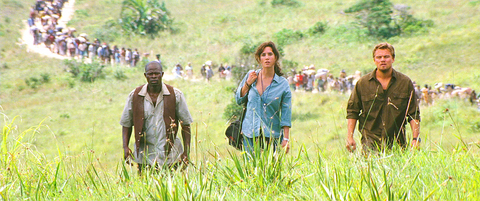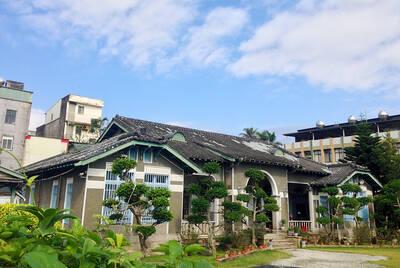The makers of Blood Diamond, an exceptionally foolish thriller starring a most excellent Leonardo DiCaprio, want you to know there may be blood on your hands, specifically your wedding finger. The story involves so-called conflict diamonds, illicitly mined stones that have been used to finance some of the most vicious wars in Africa. If films were judged solely by their good intentions, this one would be best in show. Instead, gilded in money and dripping with sanctimony, confused and mindlessly contradictory, the film is a textbook example of how easily commercialism can trump do-goodism, particularly in Hollywood.
DiCaprio plays Danny Archer, a Rhodesian-born diamond smuggler who, having been orphaned during his native country's violent struggles in the 1970s, has spent most of his 30-some years crisscrossing the continent as a soldier of fortune and a merchant of misery. Tousled and tanned, with a long, slicing gait and a killer smile, Danny looks as if he were born for trouble of the sweetest kind. But DiCaprio, perhaps because he knows that much of the audience has already crawled into his pocket, plays the smuggler as the scum he is. Even as the film coaxes Danny toward redemption, the actor fights to hold his ground and the truth of a character who has inspired the most fully sustained performance of his adult life.
This being an Edward Zwick film, it's no surprise that redemption is on the menu. Zwick likes to make epic-size movies about men of anguish and conscience who, whether they wear Civil War blue (Glory) or a Meiji kimono (The Last Samurai), invariably land on the side of the angels. Danny is initially on the side of the devils, and when we first meet him in 1999 he is trying to cross the border of a perilously unstable Sierra Leone with a stash of diamonds tucked into some goats. Busted by a patrol from Sierra Leone, he lands in jail, where he soon hears of a precious pink diamond unearthed by a fisherman turned unwilling miner, Solomon Vandy (Djimon Hounsou).

PHOTO COURTESY OF WARNER BROS
The chase is on, and on. Written by Charles Leavitt, Blood Diamond more or less plays like an exotically situated action flick as each man races toward his respective goal. Solomon hopes to reunite with his wife and three children, from whom he has been violently separated; Danny just wants a score big enough to pay his way permanently out of Africa. Theirs might be a match made in movie-genre heaven if the filmmakers didn't insist on wagging their fingers in our faces and delivering dire statistics by the ream, the intimations of Antwerp intrigue and an American journalist, Maddy Bowen (Jennifer Connelly), whose preferred interview method involves shimmying up to her subject like a pole dancer.
If the sociopolitical context weren't so appalling, this ludicrous characterization and Connelly's equally woeful performance would be easy to laugh off. But both are insulting because they transpire against a backdrop of human suffering, suffering that Maddy sternly lectures Danny for exploiting even as she snaps another photograph of the very same. (Say what!?) Any question that the filmmakers might be clued into Maddy's cluelessness, might be directly engaging the contradictions involved whenever misery becomes fodder for entertainment, is answered by the documentary-like images of children roaming a mound of garbage, by the blank-looking men and women sitting in trash-strewn streets and by the periodically brandished arm and leg stumps. The horror, the horror.
Like The Constant Gardener, this film betrays an almost quasi-touristic fascination with images of black Africans, who function principally as colorful scenery or, as in the gruesome scenes inside rebel training camps, manifestations of pure evil. Pure evil that, incidentally, likes to listen to rap and, in one case, wears a Snoop Dogg T-shirt along with his gat. Good as gold, Solomon earns a sizable share of screen time, and though the performance is expectedly sympathetic, the character has none of Danny's complexity, which means that he's inherently less interesting. Hounsou, who first came to attention as a noble African in Amistad and has often had to play the same role since, must be awfully tired of holding his head up so high.
Blood Diamond means well, but it also means box-office business. Hollywood has always traveled to faraway places (or at least tricked out sound stages) to spin yarns about moral calamity perfumed with the exotic. Whether down Mexico way or in Morocco, it generally kept the atmospheric extras — the snake-hipped dancing girl, the scoundrel in the burnoose, the smiler in the fez — stashed in the background, where they wouldn't distract from the star attractions. Blood Diamond wants to bring those blurred figures closer into view, notably through Solomon. But the rushing camerawork, breakneck editing, compulsion to go, go, go onto the next genre beat mean that there is next to no time for such niceties. The faces remain obscured, the voices muted, even as Danny comes sharply into focus.
The tragedy of Sierra Leone and the complicity of Americans, who buy more diamonds than any other consumers in the world, deserve louder, more clamorous attention than the occasional news report. And certainly big-budget Hollywood action films are plenty loud and plenty clamorous, and the volume is only turned up to shrieking with the addition of the international heartthrob who, by sacrificing himself on the altar of love in Titanic, conquered a generation of young female fans (the same demographic most likely to brandish a rock on its ring finger).
Yet while DiCaprio turns out to be an ideal fit for Blood Diamond, there's an insolvable disconnect between this serious story and the frivolous way it has been told. There is no reason to doubt the filmmakers' sincerity; only their filmmaking.

From the last quarter of 2001, research shows that real housing prices nearly tripled (before a 2012 law to enforce housing price registration, researchers tracked a few large real estate firms to estimate housing price behavior). Incomes have not kept pace, though this has not yet led to defaults. Instead, an increasing chunk of household income goes to mortgage payments. This suggests that even if incomes grow, the mortgage squeeze will still make voters feel like their paychecks won’t stretch to cover expenses. The housing price rises in the last two decades are now driving higher rents. The rental market

July 21 to July 27 If the “Taiwan Independence Association” (TIA) incident had happened four years earlier, it probably wouldn’t have caused much of an uproar. But the arrest of four young suspected independence activists in the early hours of May 9, 1991, sparked outrage, with many denouncing it as a return to the White Terror — a time when anyone could be detained for suspected seditious activity. Not only had martial law been lifted in 1987, just days earlier on May 1, the government had abolished the Temporary Provisions Effective During the Period of National Mobilization for Suppression of the Communist

When life gives you trees, make paper. That was one of the first thoughts to cross my mind as I explored what’s now called Chung Hsing Cultural and Creative Park (中興文化創意園區, CHCCP) in Yilan County’s Wujie Township (五結). Northeast Taiwan boasts an abundance of forest resources. Yilan County is home to both Taipingshan National Forest Recreation Area (太平山國家森林遊樂區) — by far the largest reserve of its kind in the country — and Makauy Ecological Park (馬告生態園區, see “Towering trees and a tranquil lake” in the May 13, 2022 edition of this newspaper). So it was inevitable that industrial-scale paper making would

Hualien lawmaker Fu Kun-chi (傅?萁) is the prime target of the recall campaigns. They want to bring him and everything he represents crashing down. This is an existential test for Fu and a critical symbolic test for the campaigners. It is also a crucial test for both the Chinese Nationalist Party (KMT) and a personal one for party Chairman Eric Chu (朱立倫). Why is Fu such a lightning rod? LOCAL LORD At the dawn of the 2020s, Fu, running as an independent candidate, beat incumbent Democratic Progressive Party (DPP) lawmaker Hsiao Bi-khim (蕭美琴) and a KMT candidate to return to the legislature representing